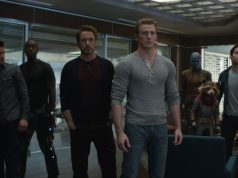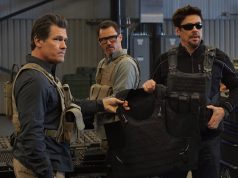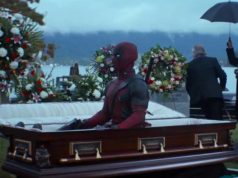Cormac McCarthy is considered by many to be America’s greatest living author, and Joel and Ethan Coen certainly comprise one of the finest voices in modern filmmaking. Despite that, I don’t know if I’d have guessed that the McCarthy/Coen combo would be such a perfect fit. They’re all brilliant, but they’re brilliant in different ways.
Or so I thought. “No Country for Old Men,” which the Coens have adapted from McCarthy’s novel, is a quintessential Coen movie, both visually and verbally — and yet most of the dialogue is taken word-for-word from the book.
I discovered this after the fact, not having read the book before seeing the movie. Watching it, I noted scenes that were in the classic Coen style, featuring Southwestern-accented men having quirky conversations a la “Raising Arizona” or “O Brother, Where Art Thou?” In one scene, two rural cops come across a drug deal gone bad, the ground littered with bodies. One of the cops observes that a couple of the victims are dressed differently from the others.
“These boys appear to be managerial,” he says. “I think we’re lookin’ at more than one fracas.”
That kind of cadence and vocabulary is common in Coenland, and it’s just as likely to come from a tertiary character (as it does here) as from the protagonist. And yet in this case, it’s not the Coens’ work. It’s straight from McCarthy.
So it would appear we have a match made in heaven, a novel that’s written cinematically being transferred to the screen by brothers who are highly proficient in the cinematic language, and who have the good sense not to make unnecessary changes.
The film hearkens back to the Coens’ darker films like “Blood Simple” and “Miller’s Crossing,” with a worldview that is decidedly bleak. Set in West Texas in 1980, it has three central characters on different sides of the law. Ed Tom Bell (Tommy Lee Jones) is an aging, weary sheriff saddened by the increasingly violent nature of the world. At the other end of the spectrum is Anton Chigurh (Javier Bardem), a terrifying psychopath who murders with a pneumatic gun (used to kill cattle, I do believe) and is on the trail of a satchel containing $2 million that went missing after that drug deal went awry.
The third figure, Llewelyn Moss (Josh Brolin), falls somewhere in the middle, law-and-order-wise. He’s an ordinary guy, a trailer park denizen with an ordinary wife (Kelly Macdonald), out hunting antelope one day when he comes across the crime scene and the bag of money. He quickly ascertains that the loot will be missed and sends the missus off to her mother’s while he deals with the repercussions.
That is the crux of the film: Chigurh has been sent to retrieve the $2 million; Llewelyn is on the run from him; Sheriff Bell is trying to keep everyone safe. Also in the mix is an unnamed man (Stephen Root) in a well-appointed office who hires the cocky Carson Wells (Woody Harrelson) to go after Chigurh and the money.
Wells seems to be familiar with Chigurh, to the point that he no longer fears him. This is a mistake. Despite his hilariously feminine haircut and calm demeanor — or maybe because of it — Chigurh is one of the creepier psychopaths in recent memory. He has no compunction about killing, no glimmer of humanity to make him reasonable. He’s perfectly content to let a coin toss decide whether he kills you or not. He embodies the film’s general view of life: It’s random, it’s often unfair, and everyone is subject to its whims.
The film has a potent mix of suspense and laughter. The Coens find a lot of dark, accidental humor in all of this, and also devote quiet attention to the details of Moss and Chigurh’s cat-and-mouse game. Moss proves to be a resourceful and intelligent man, maybe even capable of outsmarting the seemingly unstoppable Chigurh. Consequently, every scene is riveting because you never know which way it’s going to go.
That includes the ending, which at first glance may feel disappointing. Something about it stuck in my craw — yet I could tell that the problem was with me, not with McCarthy or the Coens. I was missing something. Seeing the film a second time, I caught subtleties I had missed at first, and everything fell into place. It’s a mistake to take the film for a simple crime thriller. You look at it that way and you’ll surely be let down by the conclusion. Look at it instead as a story about the capriciousness of fate, about how lives can be changed in the blink of an eye in ways that are unpredictable and unfair. One character even vocalizes the film’s theme outright: “You can’t stop what’s comin’. It ain’t all waitin’ on you. That’s vanity.”
Through the combined genius of McCarthy and the Coens, the film is constantly riveting. Even when the scenes are wordless, we are compelled to watch because, now that the dice have been thrown, we want to see where they land. It’s as close to a perfect film as I’ve seen all year: ingeniously crafted, thematically consistent, and haunting in its implications. It’s the kind of movie that sticks with you.
Sheriff Bell is the outsider in the equation, and the soul of the film. He’s outmatched by this new kind of evil represented by Chigurh and the web of people who traffic with him. You can see it in Tommy Lee Jones’ sorrowful eyes, and hear it in his Texas drawl, which he has exaggerated and ruralized. Bell has seen too much sadness in his life, and he can barely find the words to describe the awful things he’s begun to see. It doesn’t make sense. He’s getting too old for this — too old for law enforcement, too old for life, too old for everything.
NOTE: There was much discussion in the comments (back when this website allowed comments) about the fate of Moss, about the final whereabouts of the money, and about an ambiguous scene involving Bell and Chigurh and a motel room. I have blog entries discussing and explaining these subjects here (Moss’ fate), here (Bell and Chigurh, and the money), and here (other questions).
A (2 hrs., 2 min.; )





